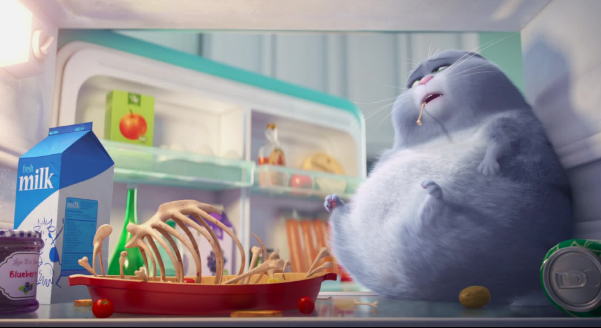One wouldn’t at first glance think a garden variety animated kids’ movie could subtly undercut at the very nature of classism in New York City, but this is precisely what Chris Renaud’s The Secret Life of Pets does. From the very moment it opens with Taylor Swift’s unfortunate “Welcome to New York,” we’re given a rosy depiction of domesticated animal existence in Manhattan. Max (Louis C.K.), a Jack Russell terrier, lives and breathes for his owner, Katie (Ellie Kemper). His cush apartment life is relished by other fellow pets in the vicinity, including a Pomeranian princess named Gidget (Jenny Slate), who harbors unreturned romantic feelings for Max.
Each day, when Katie goes to work, leaving Max to wonder where she could possibly go for all those hours, the other pets on his block share a similar, if less intense yearning–all slightly marred by the presence of infinite convenience like air conditioning and a fully stocked refrigerator. Chloe (Lake Bell), a quintessentially fat and aloof cat, for instance, looks forward to her alone time in the lap of luxury, tossing aside cat food in favor of entire roast chickens and pieces of cake. Buddy (Hannibal Buress), a dachshund, and Mel (Bobby Moynihan), a pug, also share the same comfortable malaise, endlessly entertained by the presence of myriad toys and, for Buddy, massages from a stand mixer.
The contrast between this form of pet life versus those of animals referred to by screenwriters Brian Lynch, Cinco Paul and Ken Daurio (who knows why it takes so many to write movies sometimes?) as the “Flushed Pets” comes into play soon after Max receives a new “brother.” From the moment Duke (Eric Stonestreet), a mammoth Newfoundland Katie adopts from the pound, enters the cozy confines of Max’s turf, his bed of roses suddenly starts to grow thorns with the threat of another not only infiltrating his personal reserve of opulence, but also detracting from Katie’s love for him.
On their first day out of the apartment together, led by a dog walker in a pack of eight other canines, Max and Duke are given a rude awakening to the realities that other, non-owned pets must face as Duke forces Max to an alley filled with an army of cutthroat cats led by Ozone (Steve Coogan), a busted Sphynx. When the strays cut off Max and Duke’s collars with their claws, they automatically become subject to the torment of animal control. After being loaded into the back of the van, Duke laments that a second time to the pound for him means being put to sleep. However, a seemingly rabid rabbit named Snowball (Kevin Hart) and his gang, which includes a pig called, aptly, Tattoo (Michael Beattie), come to the aid of one of their fellow flushed pets, a dog that looks like Hannibal Lecter, overturning the animal control van to free him. The first trace of full-fledged classist dissent comes when Snowball sniffs at Max and Duke and says in disgust, “You have the stink of domesticated animal all over you.” Desperate to be unlocked too, Max insists that they’re not domestic–they hate humans so much they killed their owner. Convinced enough of their roguishness to let them loose, the aphorism, “Liberate forever, domesticated never!” serves to accent the revolution of the lower caste of the animal kingdom.
Upon being led into the sewer to behold the rest of the riffraff, Max and Duke are told horror stories about how each animal ended up there. For Snowball, his magician owner abandoned him when rabbit hat tricks fell out of fashion and, for Tattoo, the former mascot of a tattoo parlor, he was rid of once his back ran out of room for inking. The tales of effortless discarding on the part of humans is not without metaphor. When an animal is “poor” or, rather, without value, they are just as disposable as people without resources to appear worthy of decent treatment.
When Max and Duke finally manage to escape from the sewer and hop onto a ferry headed toward Brooklyn (to their dismay, the opposite direction of where they should be going), the derision for money persists when Snowball calls out, “Looks like they’re going to Brooklyn,” to which another in his crew responds, “They say everyone is these days.” Snowball, referring to his revenge plans, counters, “I’m not talking about hipster real estate trends.” The very fact that this added layer of allusion to wealth via gentrification could exist in The Secret Life of Pets only serves to augment the latent theme of the film: not everyone in New York can live in a bubble of leisure and decadence, occasionally disturbed by obligatory interaction.






















